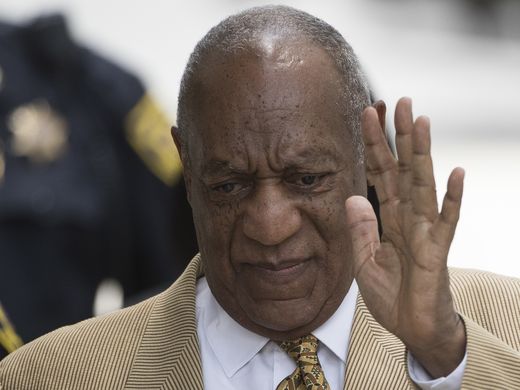Bill Cosby lost another bid to get criminal sexual-assault charges tossed, after a judge ruled Thursday that there is enough evidence to try Cosby even though he was unable to cross-examine his accuser at a preliminary hearing.
Cosby arrived at the courthouse in suburban Philadelphia to ask Judge Steven O’Neill to reverse an earlier decision to send Cosby to trial on charges of aggravated sexual assault stemming from an encounter between Cosby and accuser Andrea Constand in 2004.
Cosby’s lawyers insisted a trial could not be held until Constand gets on the stand and they get a chance to cross-examine her. Constand did not testify at the May preliminary hearing; instead, prosecutors cited a recent court ruling they believe allowed them to use her police statement taken more than a decade after the encounter.
A lower court judge agreed and upheld the charges; Cosby wanted O’Neill to reconsider.
The judge ruled against Cosby’s motion, which sought to compel Constand to testify and be cross-examined under oath, or dismiss the charges.
Cosby expressed disappointment in a statement issued by his spokesman almost immediately.
“Once again the Prosecution had the opportunity and the obligation to place Mr. Cosby’s accuser under oath so that we can search for the truth but they refused,” the statement read. “Today a man who has meant so much to so many; a man who has given so much to so many; has had his constitutional rights trampled on. We truly believe that our Supreme Court will right this wrong and reverse this decision so that we can finish the mission of proving Mr. Cosby’s innocence.”
His lead defense attorney, Brian McMonagle, vowed to restore Cosby’s “good name.”
District Attorney Kevin Steele said that “justice has been delayed for too long,” and he is “looking forward to a trial, where the defendant can confront his accuser.”
Cosby’s legal team argued that Constand’s police statement is not only hearsay, it raised more questions than it answered.
“We’re talking about an allegation of assault that happened over 11 years ago,” said another Cosby defense lawyer, Christopher Tayback, arguing to the court that the statement read during the preliminary hearing was taken so long ago that the officer who recorded it has no recollection of it. It should not stand in for the witness herself, Tayback argued.
“You know what a witness can do?” he asked the court. “A witness can recant.” He reiterated the point, saying that a witness can do and say all kinds of things that a piece of paper can’t.
Steele maintained that prosecutors wouldn’t put Andrea Constand on the stand for a preliminary hearing.
“It’s our position that we’re not going to re-traumatize victims,” he said.
Judge O’Neill said the state high court has already ruled before that hearsay testimony can stand in for a live witness. “I do not believe the Supreme Court would promulgate a rule that is unconstitutional,” he said.
Cosby sat at the defense table taking in the arguments with his finger to his lips much of the time. Constand was not in the courtroom.
Meanwhile, the state Supreme Court is reviewing the issue of whether a defendant has a right to confront a witness at a preliminary hearing, although the high court has not said when it will hear arguments on the issue.
Prosecutors in May relied on a 2015 state Superior Court ruling that allows hearsay testimony at a preliminary hearing to spare alleged victims from repeated court appearances.
Cosby, 78, a mentor to Constand, 43, when she was working at Temple University, is accused of drugging and molesting her 12 years ago at his home in Montgomery County outside Philadelphia. She accused him to police a year later but charges were never filed, so she sued him in civil court. The two settled in 2006 and the case was sealed.
Then, after dozens of women began accusing Cosby of drugging and/or raping them in episodes dating back decades, a judge in 2015 released part of the transcript of a deposition Cosby gave in the Constand civil suit, in which he acknowledged obtaining drugs to give to women he sought for sex.
Prosecutors entered into evidence three previously unseen transcripts from Cosby’s depositions taken in 2005 and 2006, but the defense will move to have them suppressed before trial, McMonagle told the judge.
Police and prosecutors reopened the Constand case in 2015, bringing the charges just weeks before the statute of limitations was due to expire in January. The new district attorney, Steele, had promised during his election campaign to pursue Cosby on criminal charges if he were elected.
Cosby says his encounter with Constand was consensual and describes the blue pills he gave her as Benadryl. Constand told police the drugs left her semi-conscious and unable to move. Her lawyers believe Cosby gave her something stronger than Benadryl.
Tayback emphasized that Cosby didn’t force Constand to take either the pills he gave her or the wine. She consumed both voluntarily. After she took them, she felt groggy and told Cosby that she couldn’t talk, according to her statement.
But there’s a contradiction there, Tayback said, paraphrasing her statement this way: “ ‘I can’t talk,’ and, yet, she’s saying it.” He suggested this raises a question about whether or not she was actually unconscious when the sexual contact happened.
Steele argued that a victim doesn’t have to be unconscious the whole time for the charges to stick. The pills and wine Cosby gave her made her unable to consent to anything, he said.
“There are very limited things that are in contention,” said Steele, after reading from Cosby’s depositions.
Cosby said he gave her drugs and that he digitally penetrated her, Steele said. That’s also what Constand said in her statement to police. The only question is whether or not it was consensual, Steele argued.
So far, nearly 60 women have accused Cosby since the fall of 2014, but no other charges have been filed against him, largely because the accusations are so old.
But Cosby also is fighting Constand and other accusers in civil court, where he has been sued for defamation over his denial of their assault claims.
Cosby has struck back with countersuits. Among other legal strategies, he is trying to force Constand to refund the money he paid her in their civil settlement (which has never been disclosed). He argued at a hearing last week that she and her lawyers violated the terms of the settlement by cooperating in the investigation of her accusations reopened by police in 2015.
Join TVC News BBM Channel C0021B67E
Follow Us On Instagram – TVCconnect
Follow us on twitter – @TVCconect
Like us on facebook – TVCconnect














